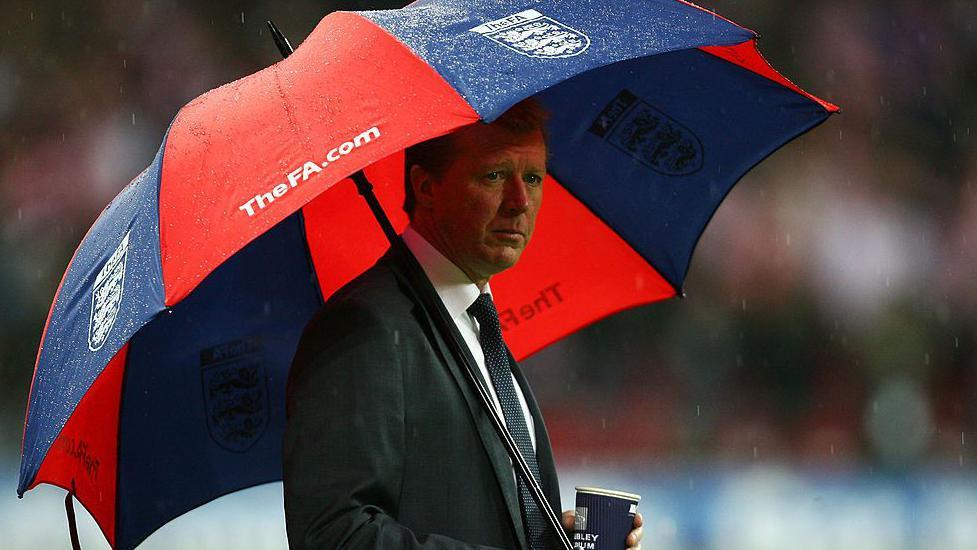 Image source, Getty Images
Image source, Getty Images
Steve McClaren sheltering under an umbrella during the Euro 2008 qualifier defeat at home to Croatia is the defining image of his time in charge
Chief football writer in Belgrade
England's deadly dull World Cup qualifying victory against Andorra had a Groundhog Day feel for long-time followers of this particular bandwagon.
Routine win. Comfortable qualifying. And then this formality is often followed by disappointment when the serious business starts at a major tournament.
I've been fortunate enough to have covered England for almost a quarter of a century.
While this is a huge privilege I enjoy immensely, games like Saturday's do make make you reflect on World Cup qualifiers and ask "when was the last time one was really good?"
A shortage of qualifying memories for England fans
OK, first of all some context and stats.
England have only lost four World Cup qualifiers in the past 30 years.
They are currently unbeaten in these matches since 2009.
To compare, in Europe only Spain (one) and Germany (three) have lost fewer during that period.
Adding European Championships, since qualifying for Euro 2004 England have played 108 qualifiers, winning 84 and losing only six. They have scored 292 goals and conceded just 51.
That is a points-per-game ratio of 2.5. In other words, if it was a Premier League season over 38 games, that would yield 95 points, enough to win the title in all but three seasons.
So you would think there would be lots of good memories - but qualifiers rarely produce raw excitement. They are usually the means to an end. In England's case an unfulfilled struggle to win the World Cup which has eluded the men's team since 1966.
England's first international at Villa Park for 20 years, a 2-0 win on Saturday, ended in front of thousands of empty seats as Andorra mounted a damage limitation exercise in the face of inevitable defeat.
There are outliers, such as captain David Beckham's sensational last-minute free-kick against Greece at Old Trafford in October 2001 that gave England a 2-2 draw and sent them to the following summer's World Cup in Japan.
And in April 2003 when a stunning full debut from the 17-year-old Wayne Rooney helped England beat Turkey 2-0 in a Euro 2004 qualifier at the Stadium of Light in Sunderland.
One searing memory is the ill-fated Euro 2008 qualifier against Croatia at Wembley in November 2007 when Steve McClaren's England, needing only a draw, lost 3-2 to a nation who had nothing to play for having already qualified.
It was the night McClaren left out goalkeeper Paul Robinson for Scott Carson, the replacement fumbling Niko Kranjcar's early shot to gift Croatia the lead.
This writer, contributing to an early iteration of BBC Sport's live text commentaries, offered up these words when watching Carson warm up in a Wembley deluge before kick-off.
"As he [Carson] looks dubiously at the penalty areas, he may just be thinking these are nightmare conditions for any keeper."
And indeed they were.
The Wembley downpour also produced the defining image of McClaren's time as England manager as he sheltered under an umbrella, meaning he will forever be known in that particular context as the 'Wally With The Brolly' - and the label stuck via a national newspaper headline.
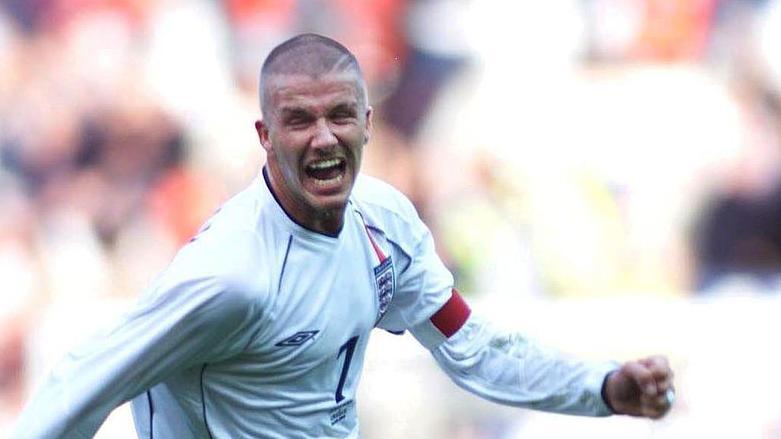 Image source, Getty Images
Image source, Getty Images
England captain David Beckham's dramatic last-minute free-kick against Greece at Old Trafford ensured qualification for the 2002 World Cup in Japan and South Korea
Why has there been a lack of entertainment?
On so many other occasions, it has been a case of watching England knock off inferior opposition, a scene observed with more regularity as the number of countries qualifying increased to 32 in 1998, then to 45 teams that will join hosts Canada, Mexico and the United States at next summer's World Cup.
And the stats are illuminating as to why this perhaps has not been as entertaining as it could be.
They show that, over the past 16 years, England's possession has increased in World Cup qualifiers.
But the shots have not increased in turn, and the average margin of victory this campaign is among the lowest seen.
Is this a sign of how widespread the low block - when teams sit deep in large numbers in a compact defensive shape - has become in these matches, or of how football has moved to being more possession based?
The truth is probably a bit of both, with England often working to break through a packed defence, using a patient approach to find space and opportunities.
Former England striker Wayne Rooney told his BBC Sounds podcast this week that these games were "horrible" to play in and could feel "pointless".
"I think it's exactly what you'd expect. Andorra come to try and upset," he said.
"England - a professional performance to win the game: 2-0, no problem.
"And it's just the games are poor. You don't enjoy it.
"So you want to see England playing Italy or Spain, and until you do you actually don't know where England are at."
It's Tuchel's job to qualify, but that's the easy bit
As dull as England qualifiers may be, it is Thomas Tuchel's job to reach tournaments and only McClaren has failed to do so, for Euro 2008, since Graham Taylor's side missed out on the 1994 World Cup in the United States.
This, however, has translated into two quarter-finals at Euro 2004 and the 2006 World Cup in Germany, the last 16 at the 2010 World Cup, the quarter-finals at Euro 2012, out at the group stage at the 2014 World Cup in Brazil, losing to Iceland in the last 16 at Euro 2016, the World Cup semi-final in 2018 in Russia, the last two Euros finals and the quarter-final at the 2022 World Cup in Qatar.
In other words, qualifying is the easy bit.
Even England's fans grew bored of Saturday's dull stroll past Andorra and there is certainly a growing sense that qualifiers are almost like a contractual obligation before the real stuff next summer.
Those of us who have watched England for so long hope to be at the scene of sporting spectaculars, but the truth is these games, especially in a group containing Albania, Andorra and Latvia, are largely devoid of jeopardy.
This is why Tuesday's meeting with Serbia in the hostile surroundings of Belgrade can actually be viewed as a true measure of England's progress under Tuchel.

 Movie
Movie 1 month ago
260
1 month ago
260 
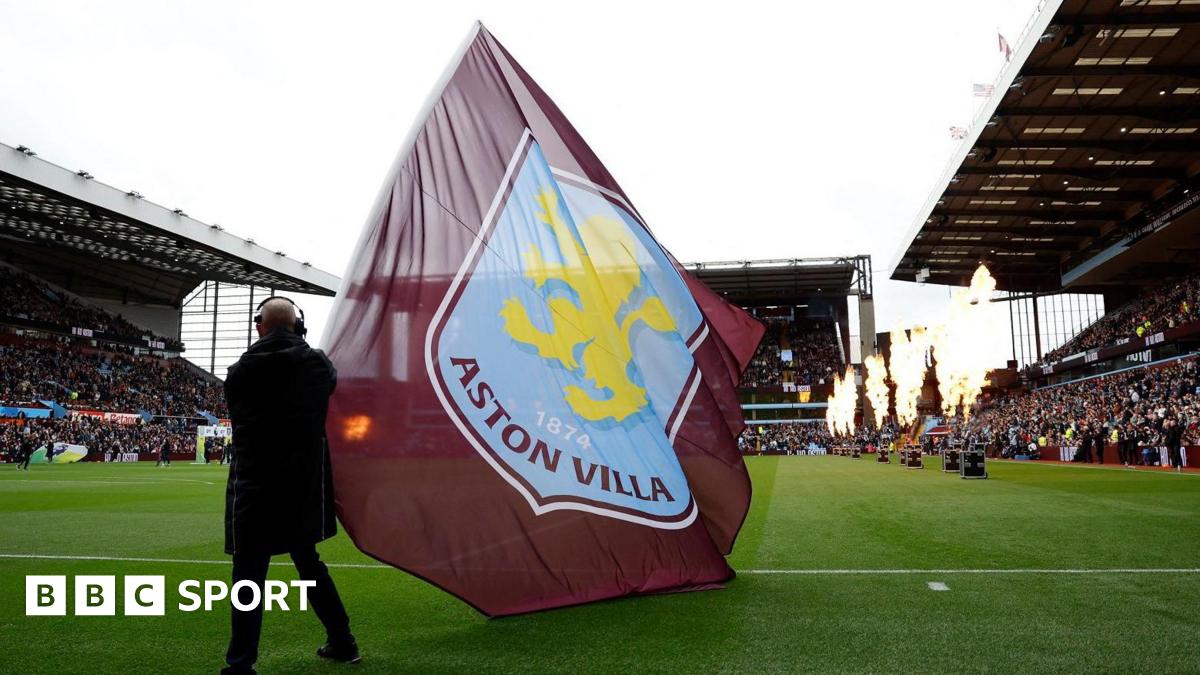

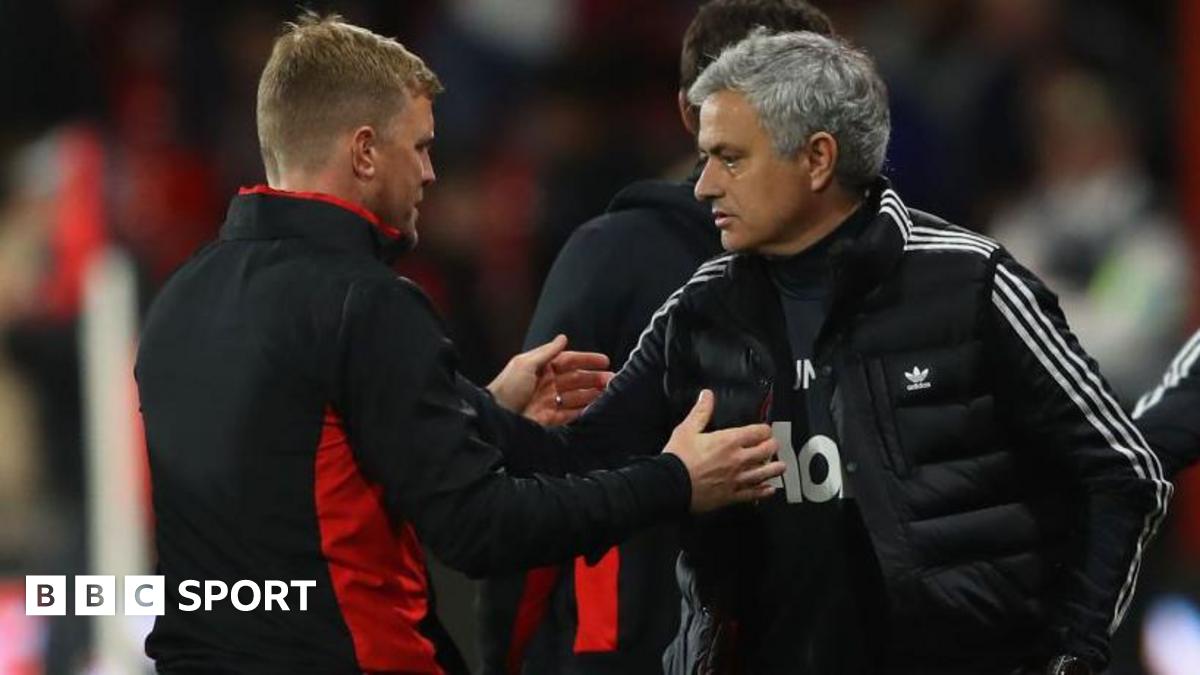

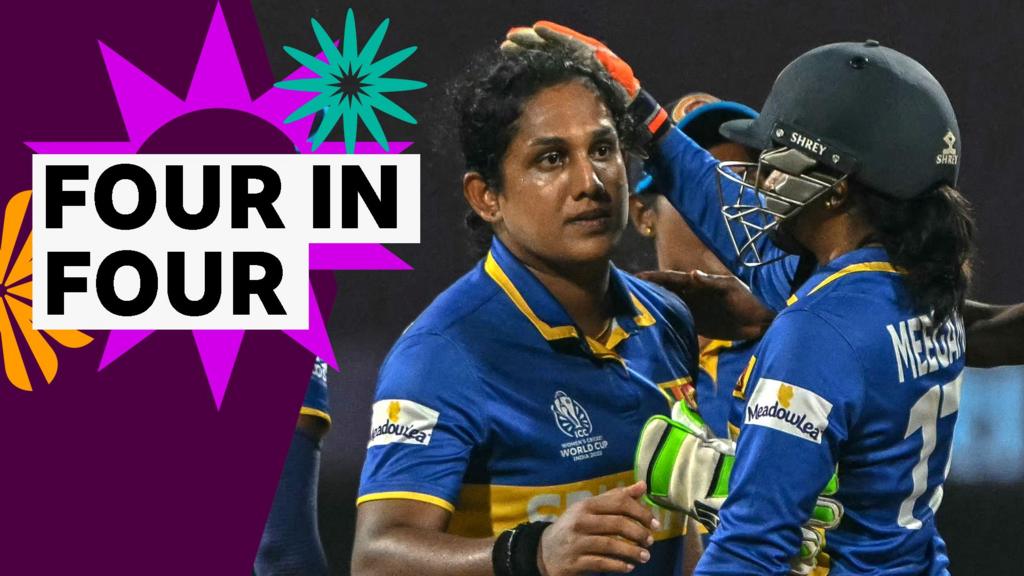
![Presidents Day Weekend Car Sales [2021 Edition] Presidents Day Weekend Car Sales [2021 Edition]](https://www.findthebestcarprice.com/wp-content/uploads/Presidents-Day-Weekend-car-sales.jpg)




 English (United States)
English (United States)